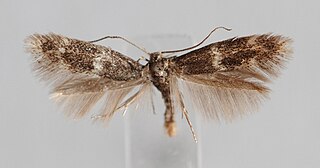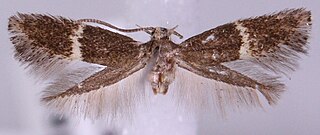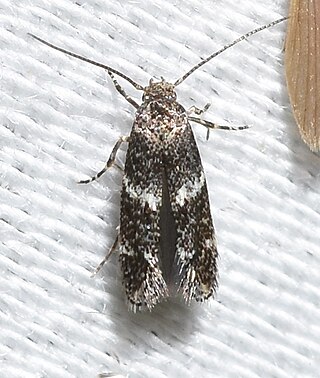
Elachista excelsicola is a moth of the family Elachistidae. It is found in Austria, Poland, Fennoscandia and northern Russia. It is also found in North America.

Elachista is a genus of gelechioid moths described by Georg Friedrich Treitschke in 1833. It is the type genus of the grass-miner moth family (Elachistidae). This family is sometimes circumscribed very loosely, including for example the Agonoxenidae and Ethmiidae which seem to be quite distinct among the Gelechioidea, as well as other lineages which are widely held to be closer to Oecophora than to Elachista and are thus placed in the concealer moth family Oecophoridae here.

Elachista fasciola is a moth of the family Elachistidae. It is found from Europe east through Russia to Japan.

Elachista dasycara is a moth of the family Elachistidae. It is in North America, including Colorado, Alberta and Saskatchewan.
Elachista stramineola is a moth of the family Elachistidae. It is found in North America, where it has been recorded from California, Alberta, Washington, British Columbia and Montana.
Elachista agilis is a moth of the family Elachistidae. It is found in Canada, where it has been recorded from Alberta and Montana.

Elachista irrorata is a moth of the family Elachistidae. It is found in North America, where it has been recorded from Illinois, Indiana, Maine, New Jersey, New York, Ohio, Ontario, Pennsylvania, Tennessee, Virginia and West Virginia.
Elachista texanica is a moth of the family Elachistidae. It is found in the United States, where it has been recorded from Texas.
Elachista staintonella is a moth of the family Elachistidae. It is found in the United States, where it has been recorded from Texas.

Elachista cana is a moth of the family Elachistidae. It is found in North America, where it has been recorded from Arizona, Colorado and Alberta.
Elachista solitaria is a moth of the family Elachistidae. It is found in the United States, where it has been recorded from Florida, Kentucky and Ohio.
Elachista telcharella is a moth of the family Elachistidae. It is found in the United States, where it has been recorded from California.
Elachista gildorella is a moth of the family Elachistidae. It is found in the United States, where it has been recorded from California.
Elachista turgonella is a moth of the family Elachistidae. It is found in the United States, where it has been recorded from California.
Elachista telerella is a moth of the family Elachistidae. It is found in the United States, where it has been recorded from Oregon.
Elachista turinella is a moth of the family Elachistidae. It is found in the United States, where it has been recorded from Arizona.
Elachista neithanella is a moth of the family Elachistidae. It is found in Canada, where it has been recorded from Saskatchewan.
Elachista tuorella is a moth of the family Elachistidae. It is found in the United States, where it has been recorded from Idaho.
Elachista suavella is a moth of the family Elachistidae. It is found in the United States, where it has been recorded from Arizona.
Hans Georg Amsel was a German entomologist with four publications ranging from 1951 to 1962. His home town was Cologne, although he frequently was in Kiel. His original job was in the banking industry, and he later worked in a bookstore. After quitting his job as bookstore worker, he decided to follow his heart and transfer to zoology, where he became an entomologist. His specific profession was studying Lepidoptera. "Soon after he was appointed as Head of Department of Entomology at the Colonial and Overseas museum called to Bremen, then rendered military service and, worked as a private scholar, he came as entomologist at the State Collections of Natural History in Karlsruhe," states a letter for his 60th birthday from the Journal of the Entomological Society of Vienna. During Amsel's career, he authored about twenty-six different Lepidoptera species and genera, and published four books.





